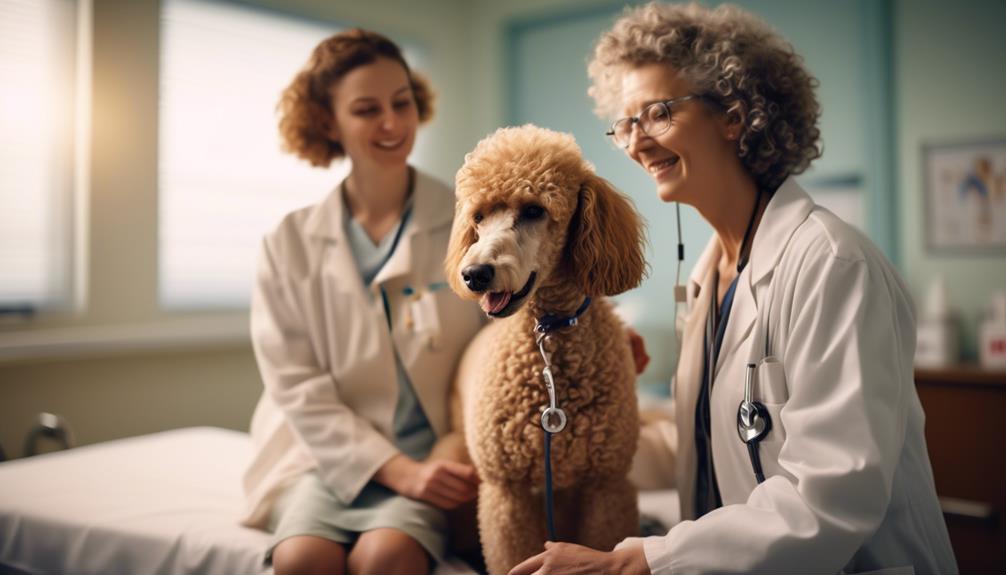What Are the Best Breeds for Therapeutic Support in Hospitals?

The best breeds for therapeutic support in hospitals include:
- Golden Retrievers
- Labrador Retrievers
- Cavalier King Charles Spaniels
These breeds are known for their friendly and gentle nature, making them ideal companions for patients.
Key Takeaways
- Labrador Retrievers and Golden Retrievers are excellent breeds for therapeutic support in hospitals due to their friendly and outgoing nature, calm temperament, adaptability to different therapy environments, and their ability to provide emotional support and companionship.
- Poodles are highly intelligent and easily trainable, making them ideal for therapeutic support in hospitals. Their calm and patient temperament, versatility in size, and ability to provide comfort and emotional support contribute to their effectiveness in this role.
- Newfoundland Dogs, with their gentle temperament and ability to provide comfort and support, are well-suited for therapeutic support in hospitals. Their large size and strength allow them to interact with both children and adults, and their high intelligence and trainability make them valuable for various therapy roles.
- Border Collies, known for their energetic and active nature, are great for engaging patients in physical activities. Their intelligence and trainability enable them to learn different therapy techniques, while their gentle and affectionate nature provides emotional support. They can also understand and respond to cues from healthcare professionals.
- Cavalier King Charles Spaniels and Bichon Frises are popular therapy dogs that bring joy and companionship. Their affectionate and gentle nature makes them ideal for providing comfort in settings like nursing homes. Their small size allows them to navigate hospital settings easily, and they create a sense of ease and trust with individuals. Bichon Frises, in particular, require proper training due to the demands of therapy work, but their non-shedding coat and affectionate nature can make a significant impact on mental health and well-being.
Labrador Retriever
Labrador Retrievers are an ideal choice for therapy work in hospitals due to their friendly and outgoing nature, calm temperament, and adaptability to different therapy environments. These beloved breeds excel in therapy dog work and are often seen providing comfort and companionship to those in need.
Labrador Retrievers are known for their gentle and patient demeanor, making them perfect for interacting with patients in hospitals and rehabilitation centers. Their size and energy level also make them suitable for various therapy environments, whether it be a busy hospital ward or a calm nursing home setting.
Labrador Retrievers have a natural affinity for humans and are highly trainable, which is crucial for therapy work. They can be taught specific tasks and commands to assist individuals with physical disabilities, making their service invaluable. These dogs have the ability to sense and respond to human emotions, offering comfort and support to those going through difficult times.
Their friendly disposition and adaptability also make them suitable for working with children, who may find solace and joy in their presence. In nursing homes, Labrador Retrievers bring joy and companionship to the elderly residents. Their gentle nature and willingness to interact with people of all ages make them a popular choice for therapy work in these settings. The presence of a Labrador Retriever can uplift spirits, reduce loneliness, and promote overall well-being among the residents.
Golden Retriever

Golden Retrievers are renowned for their friendly and intelligent nature, making them an excellent choice for therapy work in hospitals. Their calm and patient temperament, combined with their adaptability and eagerness to please, make them well-suited for providing therapeutic support in various healthcare settings. These qualities have earned them a special place as one of the most commonly chosen breeds for therapy work.
The Golden Retriever's gentle and comforting nature makes them ideal for interacting with patients, providing emotional support, and promoting a sense of well-being. Their size and energy level allow them to engage in different activities, such as walking alongside patients or participating in animal-assisted therapy sessions. Whether it's comforting a child undergoing treatment or offering companionship to an elderly patient, Golden Retrievers excel at providing the emotional support that individuals in hospitals often need.
In the context of therapeutic support in hospitals, the Golden Retriever's intelligence and trainability are also crucial factors. These qualities allow them to learn and perform specific tasks that can aid in patient rehabilitation or assist healthcare professionals in their work. For instance, they can be trained to retrieve items, open doors, or even sense changes in a patient's condition.
Below is a table summarizing the key attributes of Golden Retrievers in the context of therapy work in hospitals:
| Attribute | Description |
|---|---|
| Friendly and Intelligent Nature | Golden Retrievers are known for their affable and smart personality, enabling them to connect with patients effectively. |
| Calm and Patient Temperament | Their composed demeanor allows them to remain calm in stressful environments and provide a soothing presence for patients. |
| Adaptability and Eagerness to Please | Golden Retrievers readily adapt to different therapy settings and are always eager to fulfill their role in supporting others. |
Poodle

Poodles, known for their intelligence and versatility, are highly regarded and favored for their suitability as therapy dogs in a variety of healthcare settings. Here are three reasons why poodles make great therapy dogs:
- Trainability: Poodles are highly intelligent and easily trainable, which is crucial for therapy work. Their ability to quickly learn and follow commands makes them ideal for providing support and assistance to individuals in need.
- Calm and Patient Temperament: Poodles have a naturally calm and patient temperament, making them well-suited for therapy work. Their gentle and understanding nature allows them to provide comfort and emotional support to patients, creating a soothing environment in hospitals, nursing homes, and other healthcare facilities.
- Versatility in Size: Poodles come in different sizes, including standard, miniature, and toy. This versatility allows them to adapt to various therapy environments. Smaller poodles can easily navigate tight spaces and provide companionship to individuals who may benefit from a smaller breed, while larger poodles can offer physical support and assistance.
With their intelligence, calm demeanor, and adaptability, poodles are an excellent choice for therapy work. Whether it's in hospitals, nursing homes, or other healthcare settings, poodles can bring joy, comfort, and healing to those in need.
Newfoundland

As we shift our focus from the intelligent and versatile poodles, we now turn our attention to the gentle and patient Newfoundland dogs, known for their calming presence and adaptability in therapy roles.
Newfoundland dogs are a popular choice for therapy work in hospitals and nursing homes due to their gentle temperament and ability to provide comfort and support. One of the key qualities that make Newfoundland dogs excellent therapy dogs is their gentle temperament. They're known for their patience and calmness, which can have a soothing effect on patients and help create a positive and comforting environment. Their large size and strength also make them well-suited for interacting with both children and adults, providing a sense of security and reassurance.
In addition to their gentle nature, Newfoundland dogs are highly intelligent and trainable. This makes them adaptable to various therapy roles and allows them to learn and respond to specific commands or tasks. Their intelligence also enables them to assess and adjust their behavior based on the needs of the individuals they're supporting.
The presence of a Newfoundland therapy dog can bring immense joy and comfort to those in need. Their calming effect and comforting presence can help reduce anxiety, stress, and feelings of loneliness. Newfoundland dogs have a natural affinity for providing support and are known for going above and beyond to bring comfort to others.
Border Collie

A loyal and highly intelligent breed, the Border Collie is well-suited for active therapy roles due to their energetic nature. Here are three reasons why they make excellent therapy dogs in hospitals:
- Energetic and Active:
- Border Collies have an abundance of energy and require regular exercise and mental stimulation.
- This makes them perfect for patients who enjoy engaging in physical activities and outdoor games.
- Whether it's playing fetch or going for a brisk walk, these dogs can provide the necessary motivation to get people moving and active.
- Intelligent and Trainable:
- Border Collies are known for their intelligence and ability to learn quickly.
- This makes them highly trainable and adaptable to different therapy techniques.
- They can be taught a wide range of skills and commands that can be tailored to meet the specific needs of patients in hospitals.
- Their intelligence also allows them to understand and respond to cues from healthcare professionals, ensuring a safe and effective therapy session.
- Gentle and Affectionate:
- Despite their high energy levels, Border Collies have a gentle and affectionate nature.
- They can provide emotional support and comfort to patients in hospitals, especially those who are feeling anxious or lonely.
- Their presence alone can bring a sense of calm and happiness to the environment, creating a positive atmosphere for healing and recovery.
Cavalier King Charles Spaniel

With their affectionate and gentle nature, the Cavalier King Charles Spaniel is a perfect breed for providing therapeutic support in hospitals. These small therapy dogs have a natural ability to provide comfort to people in need, making them ideal for nursing homes and similar environments. Known for their friendly and sociable temperament, they're popular therapy dogs that bring joy and companionship to patients.
Cavalier King Charles Spaniels are among the best breeds for therapy dog work due to their kind and loving nature. Their small size allows them to easily navigate hospital settings and provide comfort to individuals in various situations. Whether it's sitting on a patient's lap or simply being by their side, these small dog breeds have a calming influence that can make a significant difference in a person's emotional well-being.
Their adaptability and love for being around people make Cavalier King Charles Spaniels excellent therapy dogs for patients of all ages. They're particularly well-suited for working with wheelchair users or patients who may have limited mobility, as their gentle nature helps create a sense of ease and trust.
Bichon Frise

Moving on to the next breed, the Bichon Frise, proves to be an excellent choice for therapy dog work in hospitals and other therapeutic environments. Here are three reasons why the Bichon Frise is well-suited for this important role:
- Adaptability: Bichon Frise are smart and quick learners, which allows them to adapt to various therapy environments. Their ability to understand and respond to different situations makes them a valuable asset in providing comfort and support.
- Gentle Temperament: With their friendly and gentle nature, Bichon Frise are perfect for hospitals, schools, and hospices, especially for individuals who may feel intimidated by larger dog breeds. Their calm and soothing presence can help create a welcoming and peaceful atmosphere for people in need.
- Small Size: The compact size of the Bichon Frise makes them ideal therapy dogs for small apartments and for comforting bed-bound patients. They can easily navigate tight spaces and provide companionship to those who are confined to their beds, bringing joy and comfort to their lives.
With their non-shedding coat and affectionate nature, the Bichon Frise is well-suited for providing comfort and support in therapeutic environments. However, it's important to note that proper training is essential to ensure they're equipped to handle the demands of therapy work. By investing time and effort into their training, Bichon Frise can make a significant impact on the mental health and well-being of those they serve.
Frequently Asked Questions
What Breed of Dog Is Used for Therapy?
Therapy dogs come in various breeds and bring comfort to hospitals, nursing homes, and schools. They must be well-behaved and obtain certification. Temperament, friendliness, and adaptability are crucial qualities for therapy dogs.
What Is the Number 1 Therapy Dog?
The number one therapy dog is the Golden Retriever. With their gentle nature and adaptability, they are highly suited for providing therapeutic support in hospitals and various healthcare settings.
What Is the Best Breed for an Assistance Dog?
The best breed for an assistance dog depends on the specific needs of the individual. Different breeds have different strengths, such as Golden Retrievers being known for their calmness and Labrador Retrievers for their intelligence and trainability.
What Is the Most Therapeutic Pet?
The most therapeutic pet depends on individual needs and preferences. Dogs, cats, horses, and even rabbits can provide benefits in animal-assisted therapy. The key is the bond and connection formed, rather than the specific breed.









